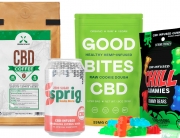
Cost of cGMP compliance for hemp derivative manufacturers can be prohibitive in the early stage of their businesses. There are so many different demands on cash flow to grow their revenue stream and the planning for startup costs almost never include compliance and regulatory ones.
The passage of the 2018 United States Agriculture Improvement Act removed industrial hemp, defined as Cannabis sativa L. containing less than 0.3% THC content by dry weight, from Schedule I of the Controlled Substances Act and made it an agricultural commodity.

Large bold word GMP – good manufacturing practice written in glowing white blue letters on black background. 3d illustration.
Currently all dietary supplement manufacturers are required to implement the cGMP codes and regulations found in the CFR 21 part 111 and 117. These rules originated in 2007. The rules require that controls be in place at manufacturing, packaging, labeling, and holding in parentheses warehouse, fulfillment operations. The actual impetus for cGMP was in response to the occurrence of primarily mislabeled tainted and poor sanitation practices at the manufacturer and marketing level.
Now, in 2022, the proliferation and popularity of cannabinoid derivatives manufacturing has brought up a plethora of confusing issues to consumers. The basic manufacturing of these hemp derivatives (CBD, CBG, CBN), and other terpenes include extraction and distillation chemistry of the hemp plants. Herbal extract manufacturers have been performing this type of chemical production for over 60 years.
According to the FDA, it It is currently illegal to:
1.) market CBD by adding it to a food or labeling it as a dietary supplement.
2.) make any claims about the efficacy of the different cannabinoids
The FDA has seen only limited data about CBD. CBD products are being marketed with unproven claims.
The FDA’s position on these compounds is the marketers must submit statistically validated and relevant safety data with specific dosing date on these compounds. That is a tall order in terms of time and investment. What strength of CBD or any other Cannabinoid derivative is a safe level? Thus, there are open questions demanding answers. For which purposes is CBD probably effective? Can it be used safely as a non-prescription product? At what level? Is a hemp extract that contains CBD a different ingredient than isolated CBD?
Several companies have made the investment in capital and time to fulfill the NDI process.
(New Dietary Ingredient) The have been rejected. Meanwhile, without any regulatory framework in place by the feds, the industry has grown into billions of dollars without any significant reported
“adverse events.”
This is at the federal level. In reality, at this time, the FDA is only enforcing the illegal marketing messaging. (making unproven medical or drug claims ). In 2022, it doesn’t appear that this enforcement policy will change.
Meanwhile big Pharma’s interests are in studying the highly purified forms of the different cannabinoids for potential money-making conditions such as pain modification, psychoactive disorders), seizure preventions, and addiction treatments to name a few.





